
Court allows Lighthouse Chapel to amend defence
The High Court in Accra has granted an application filed by Lighthouse Chapel International (LCI) to amend its statement of defence and counterclaims in a suit initiated by six former pastors of the church.
The application was moved on November 8 this year by counsel for the church, Mr Kizito Beyuo.
Although the application was opposed by counsel for the plaintiffs, Kofi Bentil, it was granted by the court, presided over by Justice Juliana Ananda Aikins on November 25 this year.
The ruling, therefore, paved the way for LCI to form up its defence and counterclaims against the former pastors. LCI filed its amended defence on November 26, 2021.
The six pastors, Bishop Larry Odonkor, Bishop Oko Mensah, Rev. Edward Laryea, Pastor Seth Duncan, Pastor Edem Amankwah and Pastor Faith Makafui Fiakojo, filed their separate suits on April 19 this year.
The pastors, among other things, have sued the church over Social Security and National Insurance Trust (SSNIT) contributions, salary arrears and damages for breach of contract.
Granted arguments
The new arguments that feature in the defence of the LCI include the SSNIT report on the complaints, which was released on August 20, 2021. The SSNIT Report exonerated the church of allegations made by the plaintiffs on non-payment of SSNIT contributions.
The SSNIT report also stated that there was no employer-employee relationship between Lighthouse Chapel International and the plaintiffs for the periods in contention for non-payment of SSNIT contributions.
Additionally, the church contends that according to the National Pensions Act, 2008 (Act 766) the plaintiffs did not have the capacity to sue the church for the alleged non-payment of SSNIT contributions.
The LCI also denied any liability to the plaintiffs and said the plaintiffs’ claims were based on alleged breach of contract, and therefore, any claims concerning matters that allegedly occurred before 2015 were barred by the Limitations Act 1972 ( N.R.C.D. 54) as some of the plaintiffs’ claims date back to 2001.
Another issue which featured in the amended defence is a police report on a criminal case against Oko Mensah for allegedly stealing a car belonging to the LCI.
Other arguments
The LCI insisted that it operated an extensive lay system, a system that allowed individuals to serve as volunteers while maintaining their secular engagements as workers or students.
LCI therefore argues that for the most part of the periods in contention the plaintiffs were volunteers and not employees of the church.
Again, the church argued that LCI-Ghana was a legally, financially, administratively and governmentally independent organisation from other LCI churches outside the country’s jurisdiction, adding that the Church in Ghana only shared a spiritual relationship with the others worldwide.
Jurisdiction
The church added that pastors who left LCI Ghana to serve in other jurisdictions were not in the employment of LCI-Ghana.
The church’s case is therefore that when Bishops Larry Odonkor and Oko Mensah were serving outside Ghana they were not in the employment of LCI-Ghana.
Additionally, the church contends that it provided free accommodation and three cars for Bishop Oko Mensah throughout the 16 years of employment contrary to his claim that he was deprived of accommodation and a car.
For Pastors Faith Makafui Fiakojo, Seth Duncan and Edem Amankwah, the LCI noted that the plaintiffs were volunteer pastors and hence it owed them no salaries and SSNIT contributions.
